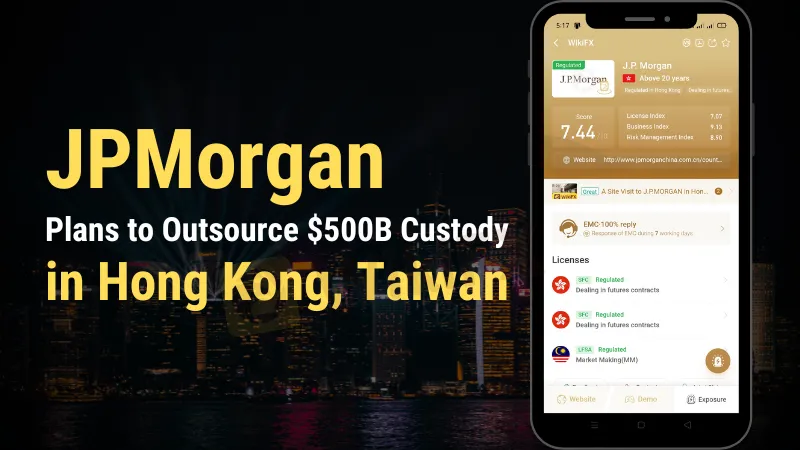简体中文
繁體中文
English
Pусский
日本語
ภาษาไทย
Tiếng Việt
Bahasa Indonesia
Español
हिन्दी
Filippiiniläinen
Français
Deutsch
Português
Türkçe
한국어
العربية
JPMorgan Plans to Outsource $500B Custody in Hong Kong, Taiwan
Abstract:JPMorgan to outsource $500B local custody business in Hong Kong and Taiwan, marking a strategic pivot in its Asia Pacific operations amid global shifts.

JPMorgan Chase (JPM.N), a worldwide leader in financial services and the world's third-largest custodian, has announced plans to outsource its local custody operations in Hong Kong and Taiwan, demonstrating its strategic adaptability. According to people familiar with the situation, this move has set the way for large firms like Citigroup (C.N), HSBC (HSBA.L), and Standard Chartered (STAN.L) to possibly take up this significant task.
A Strategic Decision Amid Global Shifts
Currently, JPMorgan manages approximately $520 billion in client assets under custody (AUC) in these vital North Asian markets. This strategic realignment, while keeping the financial specifics under wraps, marks a notable transition in the bank's approach to its Asian operations.
The custody business, a cornerstone of financial services, involves safeguarding clients' securities and ensuring the efficient handling of transactions. Local custody services, focusing on domestic market transactions, differ from global custody services that manage cross-border investments and maintain extensive client networks. JPMorgan's decision to withdraw from local custody services in Hong Kong and Taiwan, while continuing to provide global custody solutions, signals a refocused prioritization.
JPMorgan's Strategic Evolution in Asia Pacific
This move is part of JPMorgan's broader strategy in the Asia Pacific region, which has seen it exit from local custodian services in markets like Australia and South Korea. The evolving macroeconomic landscape, coupled with geopolitical tensions, has significantly impacted investment flows and asset management strategies. Particularly, the ongoing Sino-U.S. tensions and a cooling Chinese economy have led to notable shifts in investment patterns, including substantial outflows from China and Hong Kong equities.

The Role and Importance of Asset Custodians
Asset custodians are fundamental to the finance industry, ensuring the safekeeping of investors' securities and managing essential transactions and settlements. They play a crucial role in maintaining compliance with various regulatory and tax requirements. However, with the evolving market dynamics, local custodian services have become less lucrative compared to global operations, prompting JPMorgan to reassess and realign its business focus.
JPMorgan's Continued Market Presence and Growth
Despite this strategic withdrawal from certain segments, JPMorgan continues to be a dominant force in the global custodian sector. The bank oversees an impressive $29.7 trillion in global client custody assets. In the third quarter of this year alone, JPMorgan reported a 9% increase in year-on-year revenue in its securities services division, which includes its extensive custody operations. This decision represents not just an operational shift but a strategic adaptation to the changing global financial ecosystem.
Future Prospects and Industry Implications
This move by JPMorgan is not just a business decision but a reflection of the changing dynamics in the global financial services industry. It signifies a strategic pivot towards more profitable and scalable segments of the custody business, aligning with the bank's overall growth strategy and market positioning.
Conclusion
JPMorgan's choice to outsource its local custody operations in Hong Kong and Taiwan was deliberate, demonstrating the bank's resilience and strategic vision in a volatile global financial context. JPMorgan is not only reacting to current market circumstances but also positioning itself for future success by concentrating on sectors with better development potential and profitability. This shift, which is scheduled to be completed by the end of next year, represents a new chapter in JPMorgan's operations in the Asia Pacific region, underscoring the bank's position as a dynamic and forward-thinking global custodian.
Bottom Line
JPMorgan's strategic reorientation in Hong Kong and Taiwan epitomizes its ability to navigate the complexities of the global financial market. This move, while marking a shift in its service offerings, underscores the bank's commitment to innovation and excellence, ensuring its continued leadership in the global custody domain.

Disclaimer:
The views in this article only represent the author's personal views, and do not constitute investment advice on this platform. This platform does not guarantee the accuracy, completeness and timeliness of the information in the article, and will not be liable for any loss caused by the use of or reliance on the information in the article.
Read more

OPEC's Profound Influence on the Oil Market
At present, oil prices remain relatively stable, but global economic recovery and shifting market demands continue to drive price fluctuations. Amid an uncertain global economic and geopolitical landscape, OPEC’s policies and actions remain key determinants of oil prices.

What Euro Investors Can't Afford to Miss
For euro investors, geopolitical factors, inflation data, and the European Central Bank's policy direction will determine the market trends over the next few months.

How Big is the Impact of the USD-JPY Rate Gap on the Yen?
The U.S. Federal Reserve's repeated rate cuts and the narrowing of the U.S.-Japan interest rate differential are now in sight. So, why is the U.S.-Japan interest rate differential so important for the yen’s safe-haven appeal, especially when global economic uncertainty rises?

Malaysian Man Killed in Alleged Forex Dispute-Related Attack
A 44-year-old Malaysian businessman, Wong Kai Lai, died after being attacked by about 20 men in Jenjarom, Kuala Langat, on 19 December. Police believe the attack may have been linked to a foreign currency exchange dispute.
WikiFX Broker
Latest News
Will Gold Break $2,625 Amid Fed Caution and Geopolitical Risks?
ECB Targets 2% Inflation as Medium-Term Goal
New Year, New Surge: Will Oil Prices Keep Rising?
PH SEC Issues Crypto Guidelines for Crypto-Asset Service Providers
FTX Chapter 11 Restructuring Plan Activated: $16 Billion to Be Distributed
Think Before You Click: Malaysian Loses RM240,000 to Investment Scam
Bithumb CEO Jailed and Fined Over Bribery Scheme in Token Listing Process
WikiFX Review: Something You Need to Know About Saxo
Is PGM Broker Reliable? Full Review
Terraform Labs Co-founder Do Kwon Extradited to the U.S. to Face Fraud Charges
Currency Calculator






